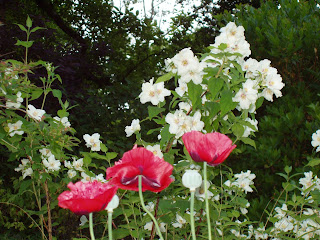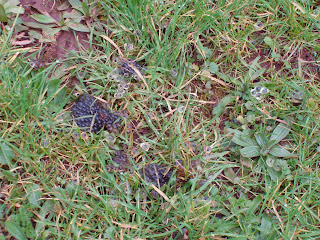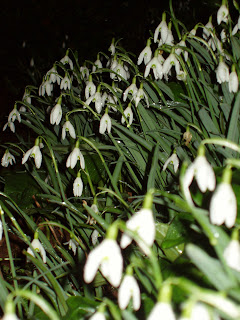The 'Poppy', a simple symbol of Remembrance.
Tonight, amongst the roses, I marvelled at the beauty of these self-seeded red emblems punctuating the summer planting. Flowers of loss, love and peace standing side by side are a perfect example of nature's healing grace. Still grieving the recent loss of my Mum, the lady who inspired my love of the natural world, I had wondered whether I would ever be moved to write again. But tonight, out of the blue, the muse danced before my eyes and once more the words have started to flow...
With my love and thanks Mum, this garden was inspired you... a touch of heaven on earth.
Tuesday, 16 July 2013
Saturday, 13 April 2013
S.O.S
A handsome, young pheasant has taken up residence in the garden, jewel coloured plumage tops golden-chestnut tail feathers. Resplendent in the morning sun he saunters past the bee-hives proprietarily, en route to the pond for a spot of refreshment. He's a cool dude, unruffled by our presence and reminds me of VGP's very first tame pheasant, Elvis, who lived here with his 'mate' Pricilla when we celebrated the millennium. They were a cheeky couple, confident, entertaining and rather partial to sunbathing on the terrace with our GSD, Roxy!
This morning, at about 4am, our slumber was disturbed by the pheasant's distinctive alarm call. Too early to be part of the song-birds dawn chorus, he had obviously been woken by a visitor to the garden. I wondered who could be lurking in the shadows at such an early hour? Three subsequent alarm calls alerted the whole garden to the presence of an interloper; the threat of imminent danger. 'Son of Elvis', as we like to call him, retires each night at the top of steps under the safety of a pittosporum bush; warm, cosy and tucked away from the view. Perhaps he spotted Mr Fox slipping in through the deer-fence to visit the pond for an early morning tipple. Or maybe it's a sign that a barn owl has taken up residence in the new owl-box, now that really would be headline news...
Prolonged winter weather is having a devastating effect on the local wildlife, barn owls are being forced to hunt in daylight because their food staple, warm mammals, has been depleted by the sodden land. I have seen several weak, emaciated birds, weighing as little as 250 grammes, on my walks through the woods. Desperate measures are called for in their fight for survival. Juicy earth worms, Badger's favourite delicacy, are in short supply as continued late frosts make the ground impenetrable, even with their powerful claws! Perhaps 'Son of Elvis' is making a plea on behalf of all his woodland friends, an SOS, imploring us to open our eyes and listen to their plight. This is a call to arms asking us to help the natural world ... before it is too late...
This morning, at about 4am, our slumber was disturbed by the pheasant's distinctive alarm call. Too early to be part of the song-birds dawn chorus, he had obviously been woken by a visitor to the garden. I wondered who could be lurking in the shadows at such an early hour? Three subsequent alarm calls alerted the whole garden to the presence of an interloper; the threat of imminent danger. 'Son of Elvis', as we like to call him, retires each night at the top of steps under the safety of a pittosporum bush; warm, cosy and tucked away from the view. Perhaps he spotted Mr Fox slipping in through the deer-fence to visit the pond for an early morning tipple. Or maybe it's a sign that a barn owl has taken up residence in the new owl-box, now that really would be headline news...
Prolonged winter weather is having a devastating effect on the local wildlife, barn owls are being forced to hunt in daylight because their food staple, warm mammals, has been depleted by the sodden land. I have seen several weak, emaciated birds, weighing as little as 250 grammes, on my walks through the woods. Desperate measures are called for in their fight for survival. Juicy earth worms, Badger's favourite delicacy, are in short supply as continued late frosts make the ground impenetrable, even with their powerful claws! Perhaps 'Son of Elvis' is making a plea on behalf of all his woodland friends, an SOS, imploring us to open our eyes and listen to their plight. This is a call to arms asking us to help the natural world ... before it is too late...
Monday, 1 April 2013
Easter Parade
"Bee suit - gloves - smoker - camera - bee-diary!" All present and correct... let the Easter Parade begin.
A frisson of tension mingled with expectation and curiosity fills the air - Have our 2012 Buckfast Queens survived the extraordinarily harsh autumn and winter conditions? Diana's colony were strong and numerous compared to young Epona, the fertilised Queen, who arrived at VGP last via Royal Mail in a jiffy bag last September. The first step is to sit quietly by the hives, to observe and talk to the bees, this meditational process calms us all and allows the bees time to adjust to our vibration. Under the midday sun workers return home laden with pollen foraged from hazel, hellebore and mahonia. This suggests that the nursery is full of hungry brood, the pollen will provide protein, fats minerals and vitamins.
Eggs galore! Epona's bees are calm and purposeful, the hive bustles with activity; industrious workers are polishing cells in preparation for their prolific young Queen to lay her eggs, larvae are being capped and newly-laid, iridescent eggs sparkle in the sunshine. On sighting the beautiful Queen we are surprised, the colony have polished and nurtured her fastidiously, removing her identification marker. We are delighted but know that we will have to husband this hive with care, when the weather improves they will quickly run out of space and there is a danger that they may decide to swarm.
In contrast, Diana's hive is sparse. Standing in the shadow of Epona's hive to the south, it has struggled to gain warmth while the sun is low in the sky. Further stress has been caused as the syrup that I fed last autumn must have held too much water, this has caused mould on the frames. Our only glimmer of hope is in the behaviour of this small colony - they are calm and orderly - not the behaviour of a Queenless hive. At the end of the inspection we finally spot Diana looking fit and healthy, huddled in a cluster at the front of the middle supa, although she is not laying prolifically there is brood. With luck we are just in time, we decide to feed the bees their own honey for the next few weeks in the hope that their liquid gold will heal and strengthen them. The contrasting tales of these two hives, standing side by side, perfectly illustrates the fine balance between life and death in the natural world.
A frisson of tension mingled with expectation and curiosity fills the air - Have our 2012 Buckfast Queens survived the extraordinarily harsh autumn and winter conditions? Diana's colony were strong and numerous compared to young Epona, the fertilised Queen, who arrived at VGP last via Royal Mail in a jiffy bag last September. The first step is to sit quietly by the hives, to observe and talk to the bees, this meditational process calms us all and allows the bees time to adjust to our vibration. Under the midday sun workers return home laden with pollen foraged from hazel, hellebore and mahonia. This suggests that the nursery is full of hungry brood, the pollen will provide protein, fats minerals and vitamins.
Eggs galore! Epona's bees are calm and purposeful, the hive bustles with activity; industrious workers are polishing cells in preparation for their prolific young Queen to lay her eggs, larvae are being capped and newly-laid, iridescent eggs sparkle in the sunshine. On sighting the beautiful Queen we are surprised, the colony have polished and nurtured her fastidiously, removing her identification marker. We are delighted but know that we will have to husband this hive with care, when the weather improves they will quickly run out of space and there is a danger that they may decide to swarm.
In contrast, Diana's hive is sparse. Standing in the shadow of Epona's hive to the south, it has struggled to gain warmth while the sun is low in the sky. Further stress has been caused as the syrup that I fed last autumn must have held too much water, this has caused mould on the frames. Our only glimmer of hope is in the behaviour of this small colony - they are calm and orderly - not the behaviour of a Queenless hive. At the end of the inspection we finally spot Diana looking fit and healthy, huddled in a cluster at the front of the middle supa, although she is not laying prolifically there is brood. With luck we are just in time, we decide to feed the bees their own honey for the next few weeks in the hope that their liquid gold will heal and strengthen them. The contrasting tales of these two hives, standing side by side, perfectly illustrates the fine balance between life and death in the natural world.
Sunday, 31 March 2013
The Highwayman
Or is she a Lady of the Highway? Perched high in the ash tree, camouflaged from view, the buzzard sits silent and still. The only clue to her presence is a deserted seed-loaded feeder... where are all our hungry feathered friends? Certainly, an unusual sight in these cruel arctic conditions...
Friday, 22 March 2013
The Secret Life of Bees
What a difference a day makes! How can we be back in the depths of winter just one week before Easter?
Earlier in the week I sighted our industrious honey bees feeding on hellebore and snowdrop, hopefully, a sign that our Queens, 'Diana' and 'Epona', now have brood in their hives as they prepare for spring. Today's sub-zero temperatures and biting winds have deterred our little stripy friends from flying and foraging, instead they are huddled in the hive keeping warm and feeding on their stores of last season's honey - seems like a good idea to me!
Inspired, I too tucked into their delicious 2012 liquid gold, lightly scented and flavoured with the imprint of last season's flowers. Honey provides a snapshot of the season in which it was harvested, just like a old fashioned photo-negative, its blend and flavour are unique to the growing conditions in the garden at a specific moment in time.
For a traditional remedy to soothe a sore throat: blend honey with lemon and a teaspoon of organic cider vinegar to make a delicious hot-toddy; the perfect antidote to these chilly arctic conditions...
Earlier in the week I sighted our industrious honey bees feeding on hellebore and snowdrop, hopefully, a sign that our Queens, 'Diana' and 'Epona', now have brood in their hives as they prepare for spring. Today's sub-zero temperatures and biting winds have deterred our little stripy friends from flying and foraging, instead they are huddled in the hive keeping warm and feeding on their stores of last season's honey - seems like a good idea to me!
Inspired, I too tucked into their delicious 2012 liquid gold, lightly scented and flavoured with the imprint of last season's flowers. Honey provides a snapshot of the season in which it was harvested, just like a old fashioned photo-negative, its blend and flavour are unique to the growing conditions in the garden at a specific moment in time.
For a traditional remedy to soothe a sore throat: blend honey with lemon and a teaspoon of organic cider vinegar to make a delicious hot-toddy; the perfect antidote to these chilly arctic conditions...
Tuesday, 19 March 2013
The Director's Chair
One of my favourites is Darcey Bussell, a rich crimson rose which blooms freely all summer, scattering the soil with purple-petal confetti throughout the season. Elegant and stylish, just like her namesake, 'Darcey' will provide depth and poise in the planting, her co-star is another David Austin, the English rose 'Grace'. Flamboyant in apricot she will add a touch of Hollywood glamour to the scene, a perfect contrast to Darceys delicate but controlled form. Grace blends well with reds and purples, forming a branching shrub with repeat flowers that scent the air throughout the summer. Her arching tendrils will silhouette sensuously against the deep crimson back-drop, setting the scene perfectly for the perennials!
Friday, 8 March 2013
Bonnie and Clyde
For the last few days we have woken to find a young buzzard perched on Wassala's head in the middle of the pond. Not being a natural fisherman, he has teamed up with the local heron to catch a breakfast of fresh water-wildlife, their particular favourite is frogspawn. The high water table is proving catastrophic for indigenous small mammals whose burrows have flooded, drowning complete communities. This loss is very evident along the hedgerows where birds of prey, starved of their regular diet, are being driven to extreme measures to survive, such as the unlikely partnership between our buzzard and the heron. This morning, in honour of their hilarious antics, we nicknamed them Bonnie and Clyde. Clyde, the buzzard, is a first class look-out man; with senses honed for fight or flight, he anticipates my every move thus evading the camera every time. Poor Wassala is losing her poise with Clyde using her head as a perch, so this morning we crossed to her island and gave her a quick lesson in Alexander Technique! For the moment her peace and serenity have been restored as she looks out across her kingdom ...
Sunday, 3 March 2013
An Owl Box in the Walnut Tree
This afternoon there has been great excitement at VGP - the much anticipated wildlife boxes have now arrived for our furry and feathered friends. On the cusp of Spring, we are hoping to tempt owls, robins, bats and dormice out of the woods to come and live in the garden with the honey-bees. Wrapped up like Eskimos, we spent three freezing hours carefully positioning the boxes: an owl-box is now facing north-east, under the canopy of the walnut tree, it has a direct flight path into the woods. Bats are to have two boxes in the ghost tree, each faces in a different direction allowing these tiny mammals maximum exposure to warmth from the sun. Ivy camouflaged Coletit and Bluetit boxes now nestle, cradled in knarled apple tree branches; this spring the chicks will be festooned in sweet blossom and seranaded in 'Buzz' by the bees. We have tucked the dormice boxes away on the back of the composters where they will benefit from maximum privacy and bio-heat from the breakdown of garden-waste. With wild nests appearing in the stone bird-holes on the studio, I feel like a site-agent allocating plots to 'Captain Beaky and his Band'! I have always adored this song...
' They march through woodlands singing songs, that tell how they have righted wrongs...
Timid Toad, Reckless Rat, Artful Owl and Batty Bat...'
The bat boxes are rough hewn to enable the tiny residents to
climb aboard. The build-spec and attention to detail in these practical boxes is superb!
Monday, 25 February 2013
Bitter Winds
Today's arctic temperatures are enough to give us all the Monday Morning Blues. Searing winds chill me to the bone, discouraging the daily garden inspection, whilst in the kitchen the kettle whistles announcing that it's time for tea! Apparently, this will be the last cold snap before spring, not a moment too soon for the inhabitants here at VGP. Close inspection of the shrubs and trees reveals tightly curled buds just waiting for the ambient temperature to burst. It feels as though we are suspended in time, like a waterfall that freezes mid-motion, the skill is to take time to breathe, contemplate and visualise nature's seasonal story that's poised to unfold.
Not only am I struggling with the cold, capturing the garden on film is like the Crypton Factor! As I persevere with a new camera, it's only the promise of delicate botanical portraits of my petalled friends that stops me composting the technology. Oh for the mental agility of the Facebook generation...
Saturday, 23 February 2013
Signs of Spring
The garden is serene today, tumbling banks of snowdrops and layered mounds of hellebores. Soft shades of the spring palette, almost edible, leaves of primrose, rose and violet are highlighted by spearmint foliage... Delicious.
The icy Scandinavian wind is making feeding and daily life difficult for our brave feathered friends. As I look out of the window they are performing amazing team work; the tiny cole tit pecks at the nuts in the feeder whilst his friend, the robin, waits below to hoover up the scraps. Now where have I seen that before?
Thursday, 14 February 2013
Hello From Heaven
Happy memories of Roxy and Asha enjoying the bluebell wood...and the freezing snow in February, they brought such joy.
Now it's the turn of Vulcan and Isis. Tout ca change!
Saturday, 9 February 2013
Snowdrops and Witch Hazel
After the blanket of snow had melted, the first of this year's snowdrops emerged, glorious in their luminosity they are positive signs of the year to come. Close inspection reveals tiny buds just waiting for the perfect conditions to burst into life. I love February, chilly days with clear, blue light, the perfect opportunity to engage with the natural world and enjoy the perfect beauty of now.
We have surveyed the garden for the nesting boxes, the majestic walnut tree will host an owl box. Facing north with a view over the valley and ancient woodland the owls will have a perfect eerie. An added bonus is that we will be able to sit, cosy by the wood burner, to watch them!
We have surveyed the garden for the nesting boxes, the majestic walnut tree will host an owl box. Facing north with a view over the valley and ancient woodland the owls will have a perfect eerie. An added bonus is that we will be able to sit, cosy by the wood burner, to watch them!
Tuesday, 22 January 2013
Monday, 21 January 2013
Ice Sculptures
Sunday, 20 January 2013
In Repose
Structure and form are crucial elements for maintaining winter interest in any garden. Yesterday's early morning inspection, after Friday's heavy snowfall, was fascinating. Pittosporum and hoheiria, both native to New Zealand, appeared to lean forward; elegant, arching branches weighed down by the Snow Queen's gift.
I savour a return to the snowy winters of childhood, allowing plants and the natural world space to rest, time to breathe... Joyful as it has been to watch the first daffodils unfurl their golden petals and hellebores pushing through the debris of last year's decaying foliage - it is a relief to know that it is okay to stop a while, appreciate the beauty of the here and now as we contemplate the seasons to come.
Saturday, 19 January 2013
Birds and Bees
Winter wonderland abounds! Overnight, fledgling spring shoots have been frozen in time; solitary footprints punctuate crystalised tracks.
What of our feathered and stripey friends? Garden birds struggle in these adverse conditions, carbohydrates and hydration being bare-essentials for their survival. Swinging like a pendulum, the peanut feeder plays host to chaffinches and cole-tits who clasp the wire to partake in our VGP 'Plat du Jour': Peanuts and Chilled Waterfall Water 2013.
What of our feathered and stripey friends? Garden birds struggle in these adverse conditions, carbohydrates and hydration being bare-essentials for their survival. Swinging like a pendulum, the peanut feeder plays host to chaffinches and cole-tits who clasp the wire to partake in our VGP 'Plat du Jour': Peanuts and Chilled Waterfall Water 2013.
Subscribe to:
Comments (Atom)



























